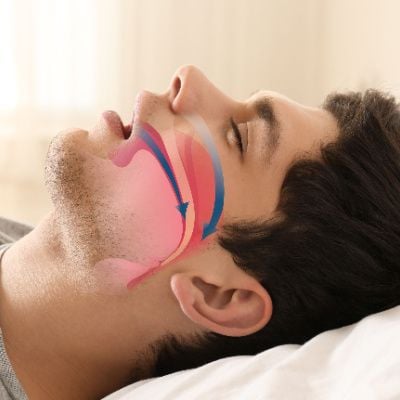 Getting a good night's sleep is integral not just to your physical health but your mental health, too. However, that may not be the case for you if you have sleep apnea.
Getting a good night's sleep is integral not just to your physical health but your mental health, too. However, that may not be the case for you if you have sleep apnea.
Understanding the signs and symptoms of sleep apnea and an accurate diagnosis by a board-certified ENT physician can aid in seeking treatment and restoring your overall quality of life.
What is Sleep Apnea?
Sleep apnea is a medical disorder that occurs when your breathing stops and starts back up again for intermittent periods while you sleep. While this commonly occurring disorder is serious, it often goes undiagnosed and untreated as it's usually brief and happens while you sleep.
According to the American Sleep Association, there are three main types of sleep apnea:
- Obstructive sleep apnea
The most common type, obstructive sleep apnea, occurs when the airway is physically blocked during sleep for various reasons, including relaxing your throat muscles when asleep. - Central sleep apnea
Central sleep apnea happens when the brain fails to signal the muscles in your respiratory control center correctly. - Complex sleep apnea
Complex sleep apnea happens when a patient suffers from both primary forms of sleep apnea, making treatment much more complicated.
What are the Causes of Sleep Apnea?
While certain risk factors can make you predisposed to sleep apnea, almost anyone—including children—can develop sleep apnea.
The most common causes of sleep apnea include:
- Weight
- Large anatomy, including a neck, tongue, and tonsils
- Family history
- Age
While several risk factors are associated with the development of sleep apnea, this condition tends to occur more often in men 45 years of age and older. Other common risk factors associated with this condition include:
- The use of drugs or alcohol
- Cigarette smoking
- Underlying medical conditions such as cardiac insufficiencies, diabetes, or chronic lung conditions
What are the Symptoms of Sleep Apnea?
If you have sleep apnea, you may snore much louder while you sleep. You will also notice pauses in their breath—for 10 seconds or more—and shallow breaths that include gasping or choking. Sleep is never comfortable for people with sleep apnea, so it's common to find them restless while in bed at night.
This snoring often causes decreased sleep quality, which leads to you experiencing the following symptoms:
- Loud snoring
- Excessive tiredness during the day
- Drowsiness
- Irritability
- Dry mouth
- Headaches
- Inability to concentrate
- High blood pressure
- Heart issues
How is Sleep Apnea Diagnosed?
For patients with sleep apnea symptoms, several tests may be recommended by your board-certified ENT. This can include:
- A thorough physical exam
- Bloodwork
- A sleep study, also known as polysomnography
During a sleep study, you're hooked to various equipment that measures brain waves, airflow, eye movements, heart rate, and sleeping positions. A sleep study is one of the most comprehensive tests for diagnosing sleep apnea in patients.
Sleep Apnea Treatments are Safe When Performed by a Board-Certified ENT Doctor
Treatment for sleep apnea involves a combination of lifestyle changes such as:
- Exercise
- Weight loss
- Changes to your diet
- Oral appliances
- Supplemental oxygen
- Medical therapies, including using a continuous positive airway pressure (CPAP) machine.
A CPAP machine uses a small motor attached to a sleep mask that allows for a steady and continuous supply of oxygen to be delivered to the body.
Disclaimer:
The information on this website is provided for educational and information purposes only and is not medical advice. Always consult with a licensed medical provider and follow their recommendations regardless of what you read on this website. If you think you are having a medical emergency, dial 911 or go to the nearest emergency room. Links to other third-party websites are provided for your convenience only. If you decide to access any of the third-party websites, you do so entirely at your own risk and subject to the terms of use for those websites. Neither The Head and Neck Center, P.C, nor any contributor to this website, makes any representation, express or implied, regarding the information provided on this website or any information you may access on a third-party website using a link. Use of this website does not establish a doctor-patient relationship. If you would like to request an appointment with a health care provider, please call our office at (610) 691-2552.


